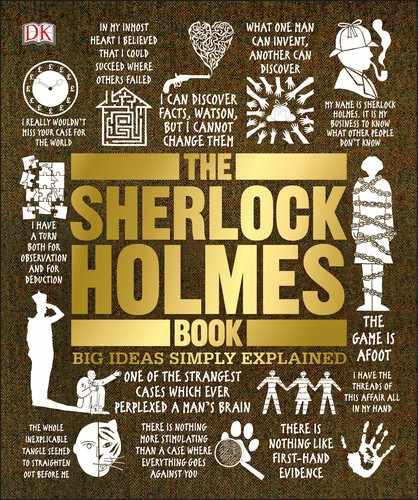
IN CONTEXT
Short story
UK: July 1893
US: July 1893
The Memoirs of Sherlock Holmes, 1894
Colonel James Barclay Commander of the Royal Mallows.
Nancy Barclay (neé Nancy Devoy) Colonel Barclay’s beautiful wife.
Miss Morrison Young friend of Nancy Barclay.
Corporal Henry “Harry” Wood Formerly of the Mallows, and an old comrade of Colonel Barclay.
While it did not feature on the official list of Conan Doyle’s favorite Holmes stories, “The Crooked Man” is one he held in particularly high regard. Although narrated by Watson, much of the story is in fact recounted by Holmes himself, when he calls on his friend one evening. In a clever move by Conan Doyle, strategic gaps in Holmes’s story allow Watson to save key details and keep the reader guessing.
Yet, before embarking on his tale, Holmes remarks that Watson must have had a busy day. When the astonished Watson asks how he knew, Holmes replies, “Elementary,” before citing a few simple clues he has observed. It is the closest he ever comes to uttering the immortal catchphrase, “Elementary, my dear Watson.” Although Holmes often refers to the doctor as “my dear Watson,” never in any story does he use the full, now iconic, phrase.
Holmes’s story
The story Holmes has to tell Watson concerns his investigation of the mysterious death of Colonel Barclay in Aldershot. After the colonel’s wife, Nancy, returned home, much distressed, from a church errand with her friend Miss Morrison, the couple had been heard arguing in the morning room. Nancy was heard to shout “David!” twice—odd since the colonel’s name is James. A crash and a piercing scream led her servants to try to break down the door, but it appeared to have been locked from the inside, so the coachman entered through the open French windows. Mrs. Barclay lay insensible on the couch and Colonel Barclay was dead, with blood streaming from his head and a ghastly expression on his face.
It seems like murder, and Mrs. Barclay is the prime suspect, but the facts don’t add up. Holmes persuades Miss Morrison to reveal what upset Nancy. She tells of an earlier encounter with a deformed man (“a dreadful-looking creature”) who was known to Nancy. Holmes tracks down the man’s lodgings, finds that his name is Henry Wood, and deduces from an Indian rupee given to his landlady that Wood is connected to the Barclays’ past in India, where they met and married.
"…the problem was already one of interest, but my observations soon made me realise that it was in truth much more extraordinary than would at first sight appear."
Sherlock Holmes
Betrayal in Bhurtee
The following morning, Holmes and Watson set off to Aldershot to call on Wood. Hearing that Nancy Barclay could be tried for murder, Wood tells his story. Thirty years ago, he and the colonel were young officers in the same corps in the British Army in India, and both fell in love with Nancy. It was Henry that Nancy loved, but her father was set on her marrying Barclay, who was destined to be an officer. During the Indian Mutiny of 1857, Barclay saw a chance to dispose of his rival, and betrayed Wood to the rebels. Wood escaped, but was disfigured as a result of being tortured. He roamed India as a street entertainer before returning to England. Then, by chance, he had seen Mrs. Barclay and followed her home. When Wood burst in through the French window, Barclay had dropped down dead, hitting his head as he fell. The “bare sight of me was like a bullet through his guilty heart,” claims Wood. Mrs. Barclay had fainted, so Wood hurried to unlock the door and call for help, then realized how things looked, and fled, taking the key.
An autopsy exonerates Mrs. Barclay, and Holmes allows the matter rest—natural justice has been done, so why involve the police? When Watson asks why Mrs. Barclay called her husband David, Holmes refers him to “the small affair” of David and Bathsheba in the Old Testament. So “the crooked man” in the story’s title may not be the deformed Wood after all, but in fact the morally corrupted Barclay.

The Indian Rebellion of 1857 saw several states rise up against the ruling East India Company. It lasted a year, and once it was quashed, Britain imposed direct rule as the new British Raj.
DAVID AND BATHSHEBA

Holmes believes that when the churchgoing Mrs. Barclay calls her husband “David,” she is invoking the Old Testament story of King David (Samuel 2, Chapter 11). The king spied Bathsheba, wife of Uriah, who was one of the king’s soldiers, bathing one day, and he made love to her. When Bathsheba became pregnant, David tried to persuade Uriah to sleep with her so he might think the baby was his. But Uriah, as a soldier on duty, refused. In desperation, David had Uriah sent to the front line in battle, where he was certain to be killed. With Uriah dead, David married Bathsheba. But he was racked with guilt, inspiring Psalm 51, (Miserere Mei, Deus: “Have Mercy on Me, Oh God”). Apparently Barclay had suffered the same guilt, for Holmes learns that he was often “sunk in the deepest gloom” for days at a time. The parallels with the situation between Barclay, Wood, and Nancy in India are striking, and suggest Conan Doyle may have used the Old Testament story as a basis for the plot of “The Crooked Man.”
